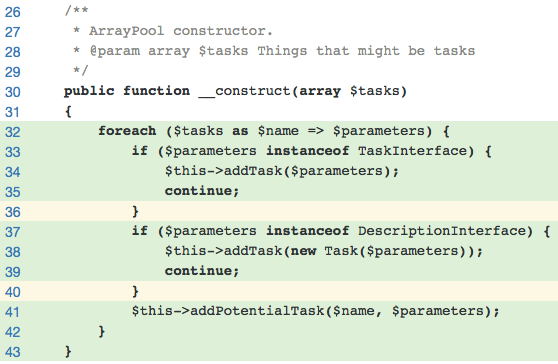I was also wondering this which is how I found your question. In the end I decided to do something a little bit dirty... use reflection.
Here's the method I want to test:
/**
* ArrayPool constructor.
* @param array $tasks Things that might be tasks
*/
public function __construct(array $tasks)
{
foreach ($tasks as $name => $parameters) {
if ($parameters instanceof TaskInterface) {
$this->addTask($parameters);
continue;
}
if ($parameters instanceof DescriptionInterface) {
$this->addTask(new Task($parameters));
continue;
}
$this->addPotentialTask($name, $parameters);
}
}
For the purposes of this test, I don't want to actually run ->addTask or ->addPotentialTask, only know that they would be called.
Here's the test:
/**
* @test
* @covers ::__construct
* @uses \Foundry\Masonry\Core\Task::__construct
*/
public function testConstruct()
{
$task = $this->getMockForAbstractClass(TaskInterface::class);
$description = $this->getMockForAbstractClass(DescriptionInterface::class);
$namedTask = 'someTask';
$parameters = [];
$arrayPool =
$this
->getMockBuilder(ArrayPool::class)
->disableOriginalConstructor()
->setMethods(['addTask', 'addPotentialTask'])
->getMock();
$arrayPool
->expects($this->at(0))
->method('addTask')
->with($task);
$arrayPool
->expects($this->at(1))
->method('addTask')
->with($this->isInstanceOf(TaskInterface::class));
$arrayPool
->expects($this->at(2))
->method('addPotentialTask')
->with($namedTask, $parameters);
$construct = $this->getObjectMethod($arrayPool, '__construct');
$construct([
0=>$task,
1=>$description,
$namedTask => $parameters
]);
}
The magic happens in getObjectMethod which takes an object and returns a callable closure that will invoke the method on an instance of the object:
/**
* Gets returns a proxy for any method of an object, regardless of scope
* @param object $object Any object
* @param string $methodName The name of the method you want to proxy
* @return \Closure
*/
protected function getObjectMethod($object, $methodName)
{
if (!is_object($object)) {
throw new \InvalidArgumentException('Can not get method of non object');
}
$reflectionMethod = new \ReflectionMethod($object, $methodName);
$reflectionMethod->setAccessible(true);
return function () use ($object, $reflectionMethod) {
return $reflectionMethod->invokeArgs($object, func_get_args());
};
}
And I know the loop and the conditions all function correctly without going off into code I don't want to enter here.
![enter image description here]()
TL;DR:
- Disble
__construct
- Set up mocks
- Use reflection to call
__construct after the object was instantiated
- Try not to lose any sleep over it

